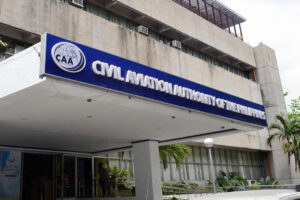The regulatory, operational and maintenance functions of the aviation authorities should be separated to ensure effiefficiency and competitiveness of air transport, according to the Joint Foreign Chambers (JFC) of the Philippines.
In a policy brief issued by the JFC’s advocacy arm, the Arangkada Philippines Project, the JFC cited the need “to make connections where there should be convergence and to disconnect where there should be independence” to ensure the adequacy of guarantee infrastructure and safety.
“More specifically, there is a need for greater coherence and convergence between entities engaged in airport development and implementation, and for the separation of regulatory and development functions (i.e. operations and maintenance), which are currently in separate entities” , it added.
It pointed out the need to bring the Civil Aviation Authority of the Philippines (CAAP) into line with international protocols and reinstate it fiscale autonomy and decouple development, ownership and research functions.
“Such distribution is crucial to streamlining operations, improving safety and ensuring Philippine airports meet global standards,” the report said.
The policy letter recommended the amendment of Republic Act (RA) 9497 to restore CAAP’s fiscal autonomy and exempt staff from salary standardization requirements.
It said the agency’s fiscal autonomy was abolished by RA 10149, which required CAAP, along with other government-owned and controlled corporations (GOCCs), to declare and remit dividends to the national government.
“(RA 10149) also removed the exemption from salary standardization regulations that applied to GOCCs, resulting in standardized and less competitive salaries for technical personnel. This made it more difficult to attract and retain skilled aviation workers,” it added.
The policy letter supported the reclassificationfiassigning highly technical positions to higher salary scales and exempting CAAP from the obligation to pay dividends to the national government.
“To protect against future implied repeals of RA 9497, the proposed legislation should include a clause requiring all future repeals or amendments to be explicit, thus prohibiting implied repeals,” it added.
As of August, a bill to amend RA 9497 (Senate Bill 1003) remained pending in the Senate.
The order also recommended the creation of a Philippine Airports Authority to take over airport development, allowing the CAAP to focus solely on regulatory oversight, thus enhancing safety and efficiency.ficiency.
“Section 78 of RA 9497 directs CAAP to be responsible for the planning, development, construction, operation, maintenance or expansion of airports. As a technical regulator, CAAP also regulates the facilities it develops and operates,” the report said.
“This leads to inefficiencies and conflicts of interest,” it added.
It said the transfer of the development functions to a new entity will provide CAAP with greater flexibility to focus on its regulatory function.
Bills on the decoupling of CAAP functions, such as House Bill 02234 and Senate Bill 1073, are still pending in Congress.
Meanwhile, the order also recommended the establishment of a Philippine Transportation Safety Board (PTSB), which will conduct objective investigations into aviation incidents to improve accountability and transparency.
“The current approach to transport and passenger safety and research is fragmented and lacks independence. Transportation agencies perform multiple and conflicting functions as regulators, operators and investigators,” the report said.
It said the establishment of the PTSB will help improve transportation safety measures and ensure the implementation of transportation safety standards.
“The proposed body will be a non-regulatory and autonomous body and will be the primary agency responsible for conducting impartial and forensic evidence-based investigations into the causes of transport-related accidents and incidents,” it added.
The creation of the PTSB is covered by Senate Bill 1121 and House Bill 01801, both of which are pending.
The JFC also sought to modernize the Civil Aeronautics Act of 1952 to position the Civil Aeronautics Board as an independent economic regulator that will prioritize consumer protection.
“As airport ownership changes from public to private hands, economic regulation may become more necessary to ensure that prices of airport services promote the well-being of airport users,” the report said.
“The proposal is to integrate the economic regulatory functions of airports into the CAB mandate,” it added.
In addition to decoupling regulatory and development functions, the policy letter also recommended upgrading more gateways, prioritizing investments in national aviation safety management systems and combating illegal charters.
It also sought ratification of the Cape Town Agreement, establishment of incentives for the aviation industry and investment in human capital development and sustainability. — Justine Irish D. Table

